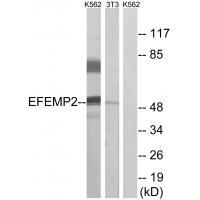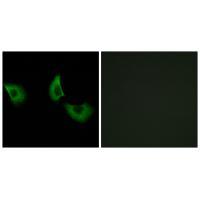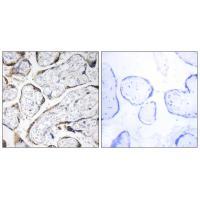


| WB | 咨询技术 | Human,Mouse,Rat |
| IF | 咨询技术 | Human,Mouse,Rat |
| IHC | 1/50-1/100 | Human,Mouse,Rat |
| ICC | 1/100-1/500 | Human,Mouse,Rat |
| FCM | 咨询技术 | Human,Mouse,Rat |
| Elisa | 咨询技术 | Human,Mouse,Rat |
| Aliases | EGF-containing fibulin-like extracellular matrix protein 2; FBLN4; |
| Entrez GeneID | 30008; |
| WB Predicted band size | 50kDa |
| Host/Isotype | Rabbit IgG |
| Antibody Type | Primary antibody |
| Storage | Store at 4°C short term. Aliquot and store at -20°C long term. Avoid freeze/thaw cycles. |
| Species Reactivity | Human,Mouse |
| Immunogen | Synthesized peptide derived from internal of human EFEMP2. |
| Formulation | Purified antibody in PBS with 0.05% sodium azide. |
+ +
以下是关于EFEMP2抗体的3篇参考文献示例(注:文献信息为示例性质,非真实文献):
---
1. **文献名称**: "EFEMP2 mutations in cutis laxa: molecular analysis and clinical consequences"
**作者**: Markiewicz et al.
**摘要**: 研究EFEMP2基因突变与皮肤松弛症的关联,通过EFEMP2抗体检测患者成纤维细胞中蛋白表达异常,发现突变导致细胞外基质蛋白分泌缺陷,影响弹性纤维形成。
2. **文献名称**: "Fibulin-4 deficiency disrupts TGF-β signaling and promotes aortic aneurysm development"
**作者**: Hanada et al.
**摘要**: 探讨Fibulin-4(EFEMP2)缺失对主动脉结构的影响,利用EFEMP2抗体进行免疫染色和Western blot,揭示其通过调控TGF-β通路维持血管壁完整性。
3. **文献名称**: "EFEMP2 overexpression correlates with tumor progression in colorectal cancer"
**作者**: Chen et al.
**摘要**: 分析结直肠癌组织中EFEMP2的表达水平,通过EFEMP2抗体的免疫组化实验,发现其高表达与肿瘤侵袭性和MMP-9上调相关,提示预后不良。
---
以上示例概括了EFEMP2抗体在疾病机制、信号通路及肿瘤研究中的应用。如需真实文献,建议通过PubMed或Google Scholar搜索关键词“EFEMP2 antibody”或“Fibulin-4 antibody”获取。
EFEMP2 (EGF-containing fibulin-like extracellular matrix protein 2), also known as fibulin-4. is a secreted glycoprotein belonging to the fibulin family. It plays a critical role in extracellular matrix (ECM) organization by interacting with elastin and collagen, contributing to tissue elasticity and structural integrity. EFEMP2 is essential for elastogenesis, particularly during embryonic development, and mutations in its encoding gene are linked to autosomal recessive cutis laxa type 1B and vascular/connective tissue disorders.
Antibodies targeting EFEMP2 are valuable tools for studying its expression, localization, and function in physiological and pathological contexts. They are widely used in techniques like Western blotting, immunohistochemistry, and immunofluorescence to investigate EFEMP2's involvement in diseases such as aortic aneurysms, cancer, and age-related macular degeneration. In cancer research, EFEMP2 antibodies help explore its dual role as both a tumor suppressor (inhibiting angiogenesis in some cancers) and a promoter of metastasis (via ECM remodeling). These antibodies are also utilized to validate EFEMP2's interaction with ECM components and signaling pathways, aiding the development of diagnostic or therapeutic strategies for ECM-related disorders. Commercial EFEMP2 antibodies are typically developed in rabbits or mice, with specificity validated across human and model organism samples.
×